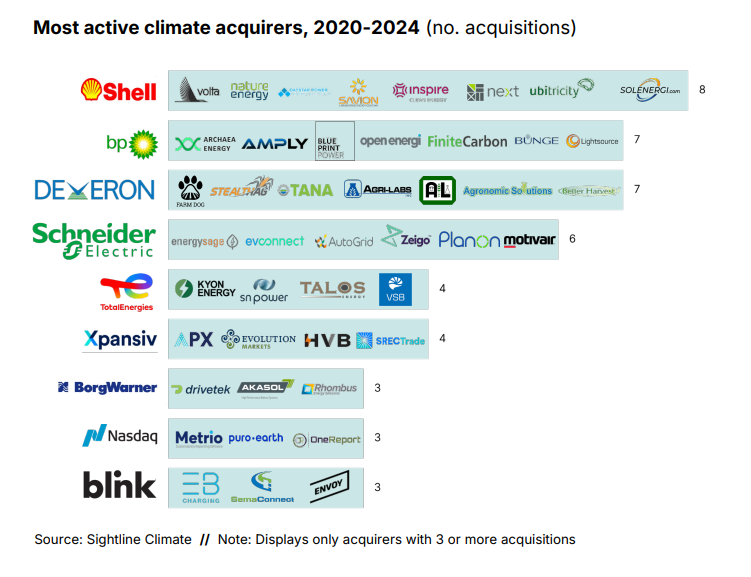Today, Joe McDonald runs Tem, an Atomico-backed platform which helps businesses buy green energy. But it’s not McDonald's first rodeo: back in 2019 he ran Limejump, another climate tech startup, which was sold to Shell, one of the world’s largest oil companies.
McDonald’s not alone. Oil and gas companies are the most active acquirers of climate tech startups. According to research by Sightline Climate, Shell made the most acquisitions globally between 2020 and 2024, buying up 8 companies. That was followed by BP, which snapped up 7.

Limejump had set out to fundraise from VCs, but realised it would struggle to raise the amount of capital it needed. “We had interest from pretty much every single large energy company,” says McDonald. “They only really wanted to acquire.”
So how does it feel to pour your heart and soul into a green company, and then sell it to the emissions heavy industry you’re aiming to disrupt?
The capital we needed in a tricky era
“When we set out building Limejump, I don’t think we thought we were building a renewable energy company to sell to an oil company,” McDonald reflects, adding that the team believed it was building an alternative energy company that would one day take on those incumbents.
McDonald says Limejump’s mission, to aggregate small, flexible assets and renewable energy generation, has not entirely been carried on under Shell, which uses it to manage both gas and batteries.
That said, to grow, Limejump required a huge amount of capital at a time when VCs weren’t willing to give it, McDonald says. The company was founded in 2013.
“Venture funds were afraid of market risk, they were afraid of those incumbents,” he says. “And it’s very difficult to bootstrap a company that's going to take on some of the biggest companies on Earth.” Shell’s injection of capital gave Limejump the balance sheet it needed to grow, McDonald says.
Limejump was not alone: McDonald says there was a cohort of companies in that era that were offered a lifeline when big energy snapped them up. By giving founders an exit and the capital to keep on building, those acquisitions have led to the birth of younger climate tech companies, McDonald argues.
“It created the first true wave of entrepreneurs coming into the space,” he says. When McDonald cofounded Tem he did so alongside three other former Limejump employees.
Another example is UK startup Modo Energy, founded by Quentin Scrimshire after he worked for climate tech Kiwi, which was sold to French energy firm Engie in 2019.
So would McDonald sell Tem to an oil and gas company?
No, he says, because the market conditions now mean climate techs have a shot at taking on incumbents – exemplified, he says, by the case of Octopus Energy, which was founded in 2015 and is now one of the UK’s largest energy companies.
Disrupting the energy market is now possible, McDonald says. “I don't think that trajectory ends up with you selling your company without realising that mission.”




